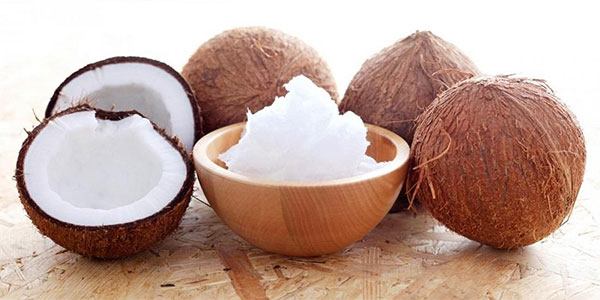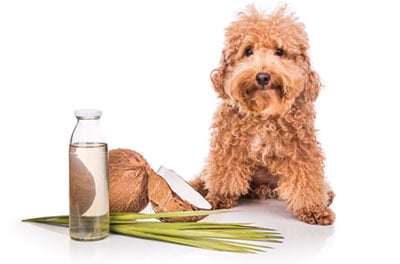There is a lot of food and drink dogs can and cannot have. The list is even smaller when it comes to what a dog can drink. There are not as many things a dog can drink compared to food.
The question is though can dogs drink coconut water? This seems to be a question being asked more and more each day. Since a dog only needs to drink water people are unsure when it comes to giving them anything else that can be drunk by their little friend.
Can Dogs Drink Coconut Water?
Coconut water is safe and actually very healthy for dogs. It is one of the best and most hydrating drinks apart from water. Coconut water contains useful substances like electrolytes that keep your dog recharged for a longer time. It also makes up for any electrolyte deficiency that your dog might have.
What is in Coconut Water?
Coconut water also contains nutritious elements like potassium and vitamin C which is excellent for the dog’s bone structure. For a long time, people have used coconut oil to keep their dog’s fur shiny and healthy and free of ticks and bugs. This has managed to keep the fur in decent condition and make for a beautiful agile dog.
Coconut water is a very small place to start for your dog’s health, but it is something and better for the long term for your dog. It can be gradually introduced to your dog’s diet and can make a hefty difference in helping your dog’s immune system and physical appearance as well.
Coconut is packed with antioxidants to support the immune system. It also helps the body form a healthy response to foreign microbes. This means coconut provides the body with an extra defense against bad bacteria, viruses, parasites, and fungi
Read the original article – American Kennel Club
You can give them coconut water in ice cube form as a reward if they do something that is well behaved and obedient. If they listen to your voice and stop doing something naughty. You can give your dog an ice cube to condition it into listening to your voice.
Dogs’ breath can sometimes smell a bit too much because of the ingredients in their food. Coconut water is an organic and healthy solution for an issue like this.

How about Coconut Milk?
You can find coconut nutrients also available in the form of coconut milk. Coconut water and milk are two distinct forms of coconut fluid but can provide the dog with similar nutrients.
With coconut milk, you will find that it can assist in protecting your dog from viruses and viral diseases. It can also help in improving your dog’s immune system and making it stronger and more resistant to allergens and other disease-causing germs.
The problem with coconut milk is that is often processed and mixed with artificial ingredients. It is very difficult to find coconut milk that is complete, 100% natural. The best option is to refine it from a coconut by yourself and not rely on the company made stuff.
A disadvantage of coconut milk is the number of fatty substances present in it which makes it unhealthy if the dog drinks a large amount of it. Try to give it to your dog in very small portions, almost like a regular medicine, or like how you would take vitamin supplements. This will give the dog the nutrients it needs for the immune system to stay healthy and resistant.
How to Give Coconut Water to a Dog
People who have taken up this profession have come up with multiple ways of taking care of your dog with the help of coconut water. They suggest giving the water to your dog in small ounces, much like coconut milk.
Also, similar to coconut milk, coconut water is very rich in carbohydrates, carbohydrates can become processed sugar inside the dog’s stomach. Which will be stored as fats, which will result in the gradual obesity of your dog, making it lazy and lethargic.
Again, similar to coconut milk you should opt for buying a coconut and extracting the water from it instead of buying processed coconut water. Coconuts that make their way through a factory will probably contain fewer nutrients and more additives.
This will obviously make it unhealthier for your dog, you should cut up the coconut and store the water in a bottle. You can then give them small amounts throughout the week if you wish.
Carbohydrates can be great for living things because most of our energy comes from our regular intake of carbohydrates and in this case, dogs are not too different from us.

Why Can Dogs Drink Coconut Water and Their Benefits
The popularity of coconut water largely comes from the widespread knowledge of the benefits that come with it. Some of the well-known benefits of coconut water, in moderation and small amounts, include low fat. As long as you buy completely natural coconut water, it can be really, low in calories but really high in nutrients.
It has low sodium occupancy making it very good for the blood pressure of dogs as well as humans. It is also free of cholesterol and very good for the heart. In terms of the fatty layer that gets frozen on the outer surface, this can help with that.
Another health aspect that coconut water can assist with is the increase in potassium. Now, potassium is the element that can help in making the bones strong and increasing muscle mass for most people. Similarly, for dogs, it can help in increasing the muscle mass and will help the dog grow stronger. It can also help the dog grow, in general.
The sugar content of coconut water is also appreciable because of how positively low it is. It still helps in the re-energizing facet like a sports drink, with excessive sugar content would have. All of these things help the dog in the best way possible.
Check out the below table from the USDA FoodData Central Database, showing what can be found in your average coconut water product.
Coconut Water - 100ml
| Name | Amount |
|---|---|
| Energy | 17kcal |
| Carbohydrate, by difference | 4.17g |
| Sugars, total including NLEA | 3.33g |
| Potassium, K | 167mg |
| Sodium, Na | 42mg |
Buying Coconut Water
When you are buying coconut water there are some things that you should pay attention to. It has been mentioned twice before that buying coconut water that is mass-produced by companies is not extremely healthy. A better option would be to prepare the coconut water at home by yourself using natural ingredients.
Preparing coconut water does not take much time. All you have to do is buy a fresh coconut from your local grocery store or fruit market. If you live in a coastal area, it is possible that you might find coconuts on your beaches as well.
You impale the coconut and pour all the water out into a container; the meat can also be eaten. The shell can be used as a seed, this is a very Eco-Friendly way of feeding your dog.
If you must buy Coconut water, you are best buying organic coconut water. As you will get a closer raw product than you would get from a mass processed product. Check out the below video showing how one organic company creates its product. Please note we do not endorse them, their video is just a good example of what organic companies do.
What You Should Keep in Mind
One serving of 325 milliliters of coconut water has up to 60 calories on average. This might not seem like much, but a daily intake will build up and become a source of excess fat to start embedding itself on their body.
Please note though, regardless of how better your dog might think it tastes as compared to water. Do not use it as a substitute for water, in any case.
Some people tend to get confused between coconut water and coconut milk. The easiest way to differentiate between the two is the most obvious one, like regular milk, coconut milk is thick, white, and murky. While the coconut water is more translucent in comparison.
Coconut milk, although good for your dog’s health is not exactly recommended because of the high-calorie content in it. I know we mentioned it above, but we wanted to give you the full details.
It will start to cause fatigue in your dog and increase the fat proportion in your dog’s diet making it completely unhealthy, especially in excess. When it comes to dogs a lot of things in excess are unhealthy, so we just wanted to make this clear for you.
A dog receives everything they need in their daily dog food. The human food or the treats your dog has should never be more than 10% of their daily diet. No matter the breed or size.

The Coconut Shell
While we are on the topic of coconuts, a precaution, do not give your dog the shell to eat or chew or anything else. There are some sites that actually suggest giving your dog the shell to chew but it can be very destructive. There are chances that the dog’s teeth will get damaged because of the stiff exterior.
The sturdiness of the shell makes it very hazardous if your dog accidentally swallows it. It can cause the dog to choke and if you are not around to help take it out, the dog might die. The shell can also splinter and cause serious digestive or stomach problems. It is not worth thinking about, just do not give your dog the shell.
There are also chances that the dog might get too used to it if you give them once. They might want it, again, and again, avoid giving the shell to your dog in the first place.

The Taste
Dogs love the taste of coconut water; this makes the water an excellent treat. Giving your dog coconut water makes it likely that the affection for you will increase and the dog might become a lot more obedient and loving towards you. As aforementioned, it is good for training and conditioning your dog, to give it a small amount after every act of good behavior that they do.
Conclusion
All in all, coconut water is amazing for your dogs’ health, and in moderation, it is one of the most advantageous naturally found substances. Take in all the information in this article and all the warning signs regarding the liquid and make use of it in the best possible method.
If you are worried about giving your dog coconut water, you should contact your local veterinarian first. You should always consult your dog’s vet if you are unsure when it comes to human food. They are the experts and know your dog personally best.
If you would like further information on food dogs can eat and foods they cannot eat, please follow the links. If they are not used to this type of food you should only give it to them in a small portion, this is just in case they have a reaction to it. This is something you should always do with any new food you introduce to them.

